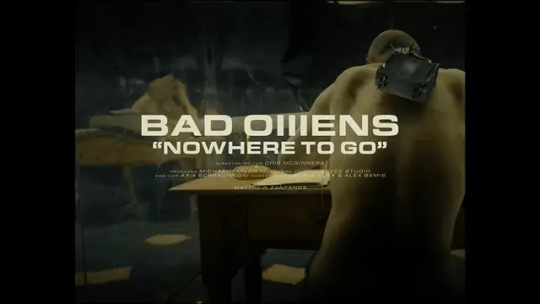#music concrete
Explore tagged Tumblr posts
Text
So many genres of music are black created. Dude didn’t even get into the roots of disco, house, and electronic club music!
13 notes
·
View notes
Text
I love these kinds of things. Wish I could ever find the typewriter and vacuum cleaner duet I wrote years ago. Not that I have anything to play a cassette tape.
6K notes
·
View notes
Video
youtube
"Smooth Operator" Marcin Ciszek
#youtube#sound#non music#field reccordings#noise#avant garde music#music concrete#sound poetry#sound art
0 notes
Video
youtube
IM NAMEN DES VOLKES - Welt ist Krieg
0 notes
Audio
Listen/purchase: Anthems For A Decaying World by Charon Nail Encryption
1 note
·
View note
Photo

Ron Arad Concrete Stereo 1983
1K notes
·
View notes
Text
Excuse me while I pick my jaw up off the floor...
#bad omens#concrete forever#concrete jungle#noah sebastian#the death of peace of mind#tdopom#music#send help#lord help me#i cant#him#just him#always him#let me live in my delusions
416 notes
·
View notes
Text

Depeche Mode
#martin gore#black swarm#composition of sound#concrete#tea & biscuits#vcmg#depeche mode#depechemode#new wave#newwave#electronic#electronics#music#noir et blanc#black & white#black and white#80s nostalgia#80s music#80s#80s aesthetic#80s rock#80s bands#1980s#80's#80#eighties#dave gahan
304 notes
·
View notes
Text

House for Music (2006-2014) at Raketenstation Hombroich near Neuss, Germany, by Raimund Abraham. Photo from August 2024.
#2000s#music pavilion#concrete#contemporary architecture#architecture#germany#raimund abraham#original photographers
402 notes
·
View notes
Note
I love your Fiyero design so much I’m chewing on him he’s so pretty <3

YEAH THE BOYO 🔥🔥🔥 He’s a squeaky toy to be chewed on and he totally enjoys annoying Glinda by also wearing a tiny ponytail ✨
I have such a love hate relationship with him and I’m trying to lean more towards love. Cause he’s just a guy™️ and if you can like. Work out things post act 2, his potential shines a lot more than being just contained within it. For ME at least.
I’m currently trying to get his design more finalized. I do plan to give him his diamond markings and I wanna showcase how he looks in various stages of the story (shiz > emerald city > scarecrow etc) and even in my au’s since he features there too.
Thank you for stopping by! What an honor :D
#fooze#billiamdoor#wicked#wicked the movie#wicked the musical#wicked fanart#fiyero tigelaar#I don’t have any concrete plans with his role yet but I’m playing around and seeing what makes sense to me#I think if I keep fiyero with the girlies then the most I will play with is thropple#and they can be an idiot trio together whether that’s in the emerald palace or in some backwoods cottage
143 notes
·
View notes
Text
Think soda is the kind to laugh loudly about nothing ever. Think soda is the type of person to click his heels together often. Think soda was the kid during recess in grade school who would ask if people wanted to watch him eat a worm. Think soda was the type of kid to try and collect cool looking quarters and then forget he was collecting them and spend them all and grieve the loss of his collection. Think soda is the type of guy to never know the lyrics of any song ever. Thinking about him. Anyway.
#again. concrete devourer bug eater.#sodapop curtis#the outsiders#the outsiders musical#the outsiders 1983#the outsiders sodapop
77 notes
·
View notes
Text

𝙸 𝚔𝚗𝚘𝚠 𝚠𝚎 𝚜𝚊𝚒𝚍 𝚝𝚑𝚊𝚝 𝚜𝚎𝚡 𝚒𝚜𝚗’𝚝 𝚕𝚘𝚟𝚎, 𝓫𝓾𝓽 𝓲𝓽 𝓼𝓮𝓮𝓶𝓼 𝓵𝓲𝓴𝓮 𝓮𝓷𝓸𝓾𝓰𝓱 𝓯𝓸𝓻 𝓾𝓼
𝙸 𝚔𝚗𝚘𝚠 𝚠𝚎 𝚜𝚊𝚒𝚍 𝚝𝚑𝚊𝚝 𝚠𝚎’𝚛𝚎 𝚑𝚊𝚟𝚒𝚗𝚐 𝚏𝚞𝚗, 𝓫𝓾𝓽 𝓘’𝓶 𝓰𝓮𝓽𝓽𝓲𝓷𝓰 𝓽𝓸𝓸 𝓷𝓾𝓶𝓫 𝓽𝓸 𝔂𝓸𝓾𝓻 𝓽𝓸𝓾𝓬𝓱
#bad omens#bad omens band#bad omens cult#noah sebastian#concrete forever#concrete forever tour#mesa arizona#mesa amphitheater#april 25 2024#4/25/2024#somebody else bad omens#concert#concert photography#metal music#metal concert#photographers on tumblr#beforeifadedaway#gaviwhy
55 notes
·
View notes
Text
Title Cards for Songs from the Concrete Jungle [The OST]












#some of the songs had no title cards or no music videos#if I missed some feel free to tell me#bad omens concrete jungle#bocj#bocj van#bocj au#bad omens#poppy#bob vylan#erra#wargasm#iris.exe
73 notes
·
View notes
Photo


BLOODLETTING (1990) Concrete Blonde
#concrete blonde#johnette napolitano#musicedit#gothedit#bandedit#usermusicdaily#usermaguire#userspacey#useroaks#goth#goth music#goth rock#*#by angel#have a bloody valentine's day from gothsource!
66 notes
·
View notes
Text
gotta confess that i watched wicked somewhat against my will and didn’t think i’d like it all that much/wouldn’t really understand the hype and yeah. yeah i was a fucking idiot. happy to report that i Completely get it now and i fear that i cannot stop thinking about it
#genuinely. what an incredible movie#like DAMN#movie went So So crazy holy fuckkkkkkk#like not even twenty minutes into the movie and i could feel the buzz of a potential hyperfixation im the back of my brain#when the wicked movie got your neuro diverging 🤕#i saw the musical as a kid but i don’t remember it well At All#but idk it just felt so perfectly adapted somehow. like it was very movie but it also had all the energy i think the musical had and more#wicked#wicked movie#cynthia erivo#ariana grande#galinda upland#elphaba thropp#gelphie#Auuughhhhh. Biting concrete and thinking about Wicked 2024
67 notes
·
View notes
Text










concrete jungle
64 notes
·
View notes